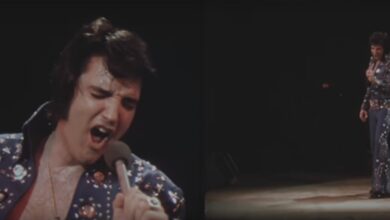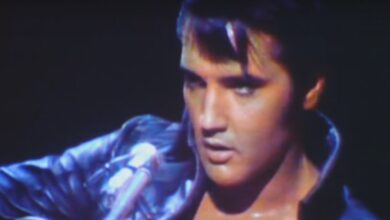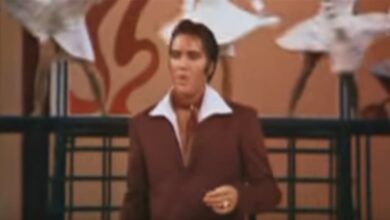A Timeless and Exquisite Masterpiece by Elvis Presley
Elvis Presley’s rendition of “Can’t Help Falling in Love” remains one of the standout achievements of his illustrious career, a song that encapsulates his unique ability to convey profound emotion through his music. Born in Tupelo, Mississippi, on January 8, 1935, Elvis became a pivotal cultural figure in the 20th century. His journey to stardom was marked by an artistry that transcended genres, seamlessly moving from rock and roll to gospel, country, and pop ballads, showcasing a versatility that few artists ever achieve.
The song “Can’t Help Falling in Love” was introduced to the world in 1961, originally crafted for the soundtrack of the film “Blue Hawaii.” The writing team of Hugo Peretti, Luigi Creatore, and George David Weiss delivered a composition rich in romantic sentiment and simplicity, linking it intricately with the themes of desire and devotion. Its gentle, lilting melody complemented Elvis’s smooth baritone, allowing his heartfelt delivery to shine through. This classic love song quickly became one of his signature pieces, emblematic of the sincerity and depth of feeling that characterized much of his work.
The lyric “Take my hand, take my whole life too, for I can’t help falling in love with you,” resonates with listeners for its emotional weight and universal message about love’s irresistible pull. This sentiment has solidified the song’s place in popular culture, making it a cherished choice for weddings and romantic moments around the world. Elvis’s interpretation, filled with earnestness, captivates audiences even decades after its initial release, underscoring the timeless quality of the song.
Over the years, “Can’t Help Falling in Love” has inspired a variety of covers, each adding new flavors while maintaining the song’s core essence. Notably, UB40’s version in 1993 infused the classic with a reggae rhythm that welcomed a new audience. Their interpretation highlighted the song’s adaptability and broad appeal. Likewise, tenor Andrea Bocelli brought his operatic flair to the track, showcasing how the emotive lyrics could be expressed through different musical styles, further broadening the song’s reach.
In recent years, emerging artists have continued to breathe new life into “Can’t Help Falling in Love.” Haley Reinhart’s stripped-back acoustic version exhibited a fresh and soulful interpretation, demonstrating the song’s ability to bridge generations and musical genres. This ongoing reinterpretation of Elvis’s work emphasizes its lasting impact and relevance in contemporary music.
Elvis’s remarkable career was underscored by a series of achievements that left an indelible mark on the entertainment landscape. His influence extended beyond music into fashion, acting, and popular culture at large. With a magnetic stage presence, he captivated audiences, creating memorable performances that became legendary. Songs like “Heartbreak Hotel” and “Jailhouse Rock” solidified his status, while his aesthetic choices and persona helped shape the image of rock and roll during its formative years.
The humble beginnings of Elvis’s life offer a sharp contrast to his later fame. Raised in a working-class family, he discovered music as an escape and a transformative force. His initial recordings at Sun Records in the 1950s catapulted him into the national spotlight, as he emerged as a figure of rebellion and freedom during a time of significant cultural shifts in America. Elvis’s unique blend of rockabilly, blues, and gospel created a sound that was wholly his own, setting the standard for future artists.
Philanthropy played a crucial role in Elvis’s life. He was known for his generosity, often supporting causes related to children and poverty alleviation. Through various charitable efforts, he demonstrated a commitment to giving back, contributing to his enduring legacy as not just a musician, but a culture-conscious icon.
Today, Elvis Presley’s influence continues to resonate in various realms, from music to film and beyond. His songs are still celebrated, reimagined, and cherished by new generations. The legacy of “Can’t Help Falling in Love” epitomizes this phenomenon, reminding us of the earnest and emotional power of music. Each interpretation by contemporary artists serves as a testament to Elvis’s profound impact on the music industry and the enduring nature of his work.
In essence, Elvis Presley’s rendition of “Can’t Help Falling in Love” serves not only as a remarkable musical achievement but also as a reflection of his extraordinary career and the artistry he brought to life. The song embodies the romance and beauty of love in a way that continues to touch hearts worldwide. As we reflect on his contributions, it becomes clear that Elvis’s emotional depth and musical genius will always hold a cherished place in the pantheon of music history, ensuring his legacy remains vibrant for generations to come.



